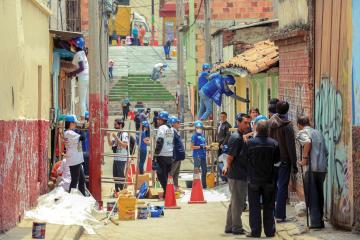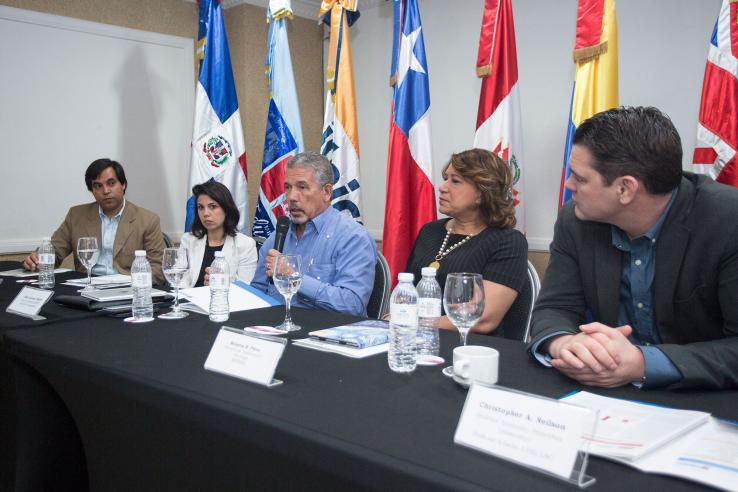
Government partnerships for the design of evidence-based policies in education in Latin America

Despite large advances in school enrollment over the last decade, approximately 262 million children, adolescents, and youth between the ages of 6 and 17 are still out of school, according to UNESCO. In Latin America and elsewhere, school dropout is a key obstacle to universal school attendance: in the region, 15.5 percent of students dropped out during their time in primary school in 2016.
How do policymakers begin to tackle such a large and complex issue? And, if policymakers do find a possible solution, how do they know it can successfully and cost-effectively work when implemented at scale?
Long-term partnerships between governments and researchers, based on the use and institutionalization of rigorous evidence, may be the answer.
On December 3, 2018, education policymakers and researchers from the Dominican Republic, Chile, Colombia, Peru, and the United States joined representatives from the Inter-American Development Bank, Teach for All, and Inicia Educación to discuss strategies for establishing these types of partnerships. Co-sponsored by J-PAL’s Latin America & the Caribbean (LAC) office, together with the Dominican Institute for Educational Quality Research and Evaluation (IDEICE) and Princeton University, the event highlighted the successes of education partnerships between governments and researchers throughout Latin America. Successful examples included the evaluation and scale-up of information dissemination policies in education, as well as the strengthening of government data centers and impact evaluation labs in Chile, the Dominican Republic, and Peru.
Implementing evidence-based education policies at scale
National-level education programs that aim to reduce school dropout by providing information to students about the returns to staying in school have proved promising in some contexts.
In the Dominican Republic, J-PAL affiliated researchers James Berry (University of Delaware) and Christopher Neilson (Princeton University), together with researchers Lucas Coffman (Harvard University) and Daniel Morales (IDEICE), evaluated a program that transmits information about the returns to education to middle-school students through the use of different forms of media, including telenovela-style videos, posters, and tablet-based information campaigns.
Preliminary results suggest the program reduced school dropout rates by between 2.5 and 3 percentage points after a year—resulting in approximately 6,500 more students staying in school. In addition, for children who received the information, it improved schooling outcomes in national examination scores by between 0.05 and 0.12 standard deviations.
Similarly, in Peru, J-PAL affiliates Francisco Gallego (Pontificia Universidad Católica de Chile), and Neilson, together with Oswaldo Molina (Universidad del Pacífico), collaborated with Innovations for Poverty Action (IPA) and the Ministry of Education’s MineduLAB to study the effects of the “Choosing a Better Future (DFM)” program. DFM also spread information about returns to schooling through videos, in addition to including more intensive, in-person information delivery to students and their parents.
Consistent with the preliminary results from the Dominican Republic, DFM decreased school dropout rates by 18.8 percent in urban areas and corrected students’ and parents’ perceptions about the returns to education. Furthermore, the intervention reduced child labor by 15 percent for girls in urban areas.
Both programs were found to be cost-effective—the cost of videos per students in Peru was only US$0.05, and increases in national examination scores in the Dominican Republic cost between US$78.5 and US$124.4 per standard deviation. Given their impact and cost-effectiveness, both programs are respectively being scaled-up by the Peruvian and Dominican governments to ensure that all public schools are reached.
Institutionalizing evidence use
Beyond these policies, partnerships between government and academia have resulted in the promotion and institutionalization of administrative data use within governments.
During the event, Juan Ariel Jimenez (Vice Minister of Development Policy of the Ministry of the Presidency, Dominican Republic), Juan Pablo Silva (former Vice Minister of the Ministry of Education in Peru), Ryan Cooper (DIPRES Impact Evaluation Coordinator, Chile), and Elianny Medina (Cabinet for Social Policy Coordination, Dominican Republic) discussed ongoing efforts throughout the region to embed innovation and impact evaluation labs and administrative data centers within governments. These units include Peru’s MineduLAB—which pilots and evaluates the effectiveness of a number of innovations in education policy—as well as the Gabinete de Coordinación de Politícas Sociales (GCPS) evidence lab and a Data Center of the State in the Dominican Republic, which harmonize administrative data across government bodies and generate evidence for social policies.
The gathering in Santo Domingo was a concrete reminder of how long-term partnerships between government and researchers can yield substantial results; either in the form of cost-effective and scalable policies that are proven to be effective in a local context or in the increased use of administrative data to ensure that policies are grounded in evidence. Such data-oriented initiatives are examples of J-PAL LAC’s long-term efforts to forge and build evidence-based government partnerships to improve the effectiveness of programs in education and more, across the continent.



